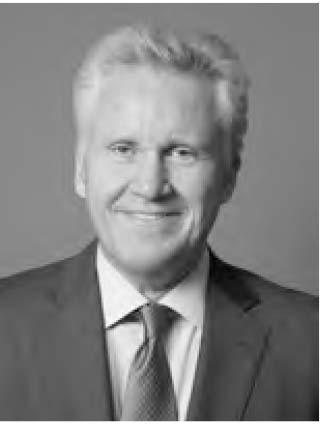WHY WE’LL BE HERE / MASSACHUSETTS
 WHO Jeff Immelt, President and CEO, General Electric
WHO Jeff Immelt, President and CEO, General Electric
SITE HISTORY The “world’s digital industry company,” as GE dubs itself, traces its origins to Thomas Edison’s laboratory in New York City. GE was incorporated in 1892 when Edison’s company merged with the Thomason-Houston of Lynn, Massachusetts, then took headquarters space in Schenectady, New York. In 1974, the company relocated to Fairfield, Connecticut. After last year’s tax hike, however, Immelt went public with his disappointment, launching a well-publicized search for a new home in June. Lured to Massachusetts by a $120 million incentive program, GE will move to an as-yet-undisclosed location in Boston’s waterfront Innovation District by 2017.
WHY MASSACHUSETTS? GE builds on what is already a significant presence in Massachusetts, with nearly 5,000 employees across the state in businesses including aviation, oil and gas and energy management. In 2014, GE moved its life sciences headquarters to Marlborough. Last year, GE announced it was relocating its energy services start-up, Current, to Boston.
REASON FOR LOCATION “Greater Boston is home to 55 colleges and universities. Massachusetts spends more on R&D than any other region in the world, and Boston attracts a diverse, technologically fluent workforce focused on solving challenges for the world. We are excited to bring our headquarters to this dynamic and creative city.”
NEW HAMPSHIRE | #24 | LAGGING GDP
 The economy is humming, but a tight labor market—and sluggish in-migration—hampers growth. After decades of luring Massachusetts residents annually by the tens of thousands, that pace has slowed to a crawl. An overhaul of “outdated” land-use and zoning policies could help attract new residents, says Dennis Delay, an economist with the New Hampshire Center for Public Policy Studies. Delay and other economists expect steady economic expansion through 2019. The New England Economic Partnership forecasts New Hampshire will continue to lag GDP growth and job creation in both New England and the nation.
The economy is humming, but a tight labor market—and sluggish in-migration—hampers growth. After decades of luring Massachusetts residents annually by the tens of thousands, that pace has slowed to a crawl. An overhaul of “outdated” land-use and zoning policies could help attract new residents, says Dennis Delay, an economist with the New Hampshire Center for Public Policy Studies. Delay and other economists expect steady economic expansion through 2019. The New England Economic Partnership forecasts New Hampshire will continue to lag GDP growth and job creation in both New England and the nation.
NEW JERSEY | #47 | BIOTECH PROMISE
 Northern New Jersey’s economic mainstays—telecom, professional services, pharmaceutical research and manufacturing—show moderate growth, while education and healthcare outpace the nation. Moderate job expansion has bolstered consumer spending, aiding the retail, entertainment and hospitality sectors.
Northern New Jersey’s economic mainstays—telecom, professional services, pharmaceutical research and manufacturing—show moderate growth, while education and healthcare outpace the nation. Moderate job expansion has bolstered consumer spending, aiding the retail, entertainment and hospitality sectors.
Professional services, long a Garden State mainstay, show signs of recovery from recessionary doldrums. JPMorgan Chase’s decision to relocate to Jersey City from Manhattan yielded 2,100 jobs—and a jolt of optimism at a time when most corporate traffic was heading out of state.
While the Garden State is closely connected to both New York and Philadelphia metro economies, such local clusters as biotech and software development expect moderate growth, offsetting stagnation in pharmaceuticals, telecom and manufacturing. Infrastructure improvements, including port-facility upgrades, may fortify economic growth in the trade and transportation sectors. Regulatory changes from Washington have roiled the financial services industry, shrinking payrolls.
Native son site selector Dennis Donovan, of Wadley-Donovan-Gutshaw Consulting, praises the state’s incentive and subsidy programs, but wishes permitting could be sped up. Central-state MSAs, including Trenton and Edison, have grown fitfully; net growth lags behind the national pace.
Chief Executive Group exists to improve the performance of U.S. CEOs, senior executives and public-company directors, helping you grow your companies, build your communities and strengthen society. Learn more at chiefexecutivegroup.com.
0

1:00 - 5:00 pm
Over 70% of Executives Surveyed Agree: Many Strategic Planning Efforts Lack Systematic Approach Tips for Enhancing Your Strategic Planning Process
Executives expressed frustration with their current strategic planning process. Issues include:
Steve Rutan and Denise Harrison have put together an afternoon workshop that will provide the tools you need to address these concerns. They have worked with hundreds of executives to develop a systematic approach that will enable your team to make better decisions during strategic planning. Steve and Denise will walk you through exercises for prioritizing your lists and steps that will reset and reinvigorate your process. This will be a hands-on workshop that will enable you to think about your business as you use the tools that are being presented. If you are ready for a Strategic Planning tune-up, select this workshop in your registration form. The additional fee of $695 will be added to your total.

2:00 - 5:00 pm
Female leaders face the same issues all leaders do, but they often face additional challenges too. In this peer session, we will facilitate a discussion of best practices and how to overcome common barriers to help women leaders be more effective within and outside their organizations.
Limited space available.

10:30 - 5:00 pm
General’s Retreat at Hermitage Golf Course
Sponsored by UBS
General’s Retreat, built in 1986 with architect Gary Roger Baird, has been voted the “Best Golf Course in Nashville” and is a “must play” when visiting the Nashville, Tennessee area. With the beautiful setting along the Cumberland River, golfers of all capabilities will thoroughly enjoy the golf, scenery and hospitality.
The golf outing fee includes transportation to and from the hotel, greens/cart fees, use of practice facilities, and boxed lunch. The bus will leave the hotel at 10:30 am for a noon shotgun start and return to the hotel after the cocktail reception following the completion of the round.